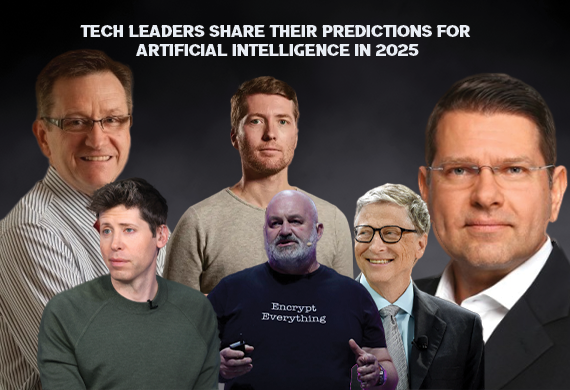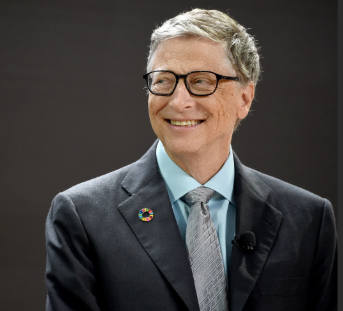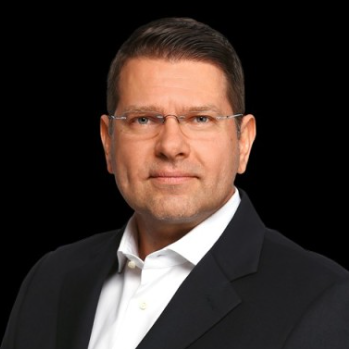Tech Leaders Share their Predictions for Artificial Intelligence in 2025
By Sefton J Britto, Correspondent at Global Leaders Insights

In 2024, Artificial Intelligence became a focal point, with its rapid advancement igniting discussions about its potential to revolutionize industries and daily life. Going into 2025, influential technologists predicted what could be the next waves of AI innovation. These forecasts delve into what is to be anticipated in terms of artificial intelligence's impact on workplaces, consumer behavior, and societal values. However, the promise of increased efficiency and transformation remains confronted with fears of job displacement, ethical dilemmas, and resistance to change. The following provide insights and predictions by major technocrats about AI around 2025.
Sam Altman: AI as digital coworkers 
Sam Altman, CEO of OpenAI, foresees 2025 as the year when AI agents become a key part of the workforce. He spotlights the significance of agentic AI, which can make use of generative AI to function as "digital coworkers." Altman predicts that these AI agents will significantly boost productivity across various industries by automating repetitive tasks and enhancing human capabilities. In a recent blog post, he stated, “We continue to believe that providing people with great tools leads to valuable, widespread outcomes.”
However, Altman also recognizes the rising concerns about job security as AI becomes more widespread. He stresses that businesses embracing this technology must find a balance between innovation and ensuring workforce stability and skill development
Bill Gates: The Importance of education 
Bill Gates has consistently emphasized the importance of education in adapting to technological changes. He has often stated that by 2025, two-thirds of all U.S. jobs will require education beyond high school.
This forecast highlights the growing need for upskilling in an AI-driven economy. As AI tools become increasingly essential across various roles, both individuals and organizations must focus on education and training to stay competitive. Gates' vision aligns with the broader trend of AI integration in the workplace, underscoring the significance of lifelong learning in an ever-changing job market.
Werner Vogels: Shifting workforces values 
Werner Vogels, Amazon's Chief Technology Officer, highlights the cultural shifts driven by technology, predicting a "quiet revolution" in 2025 where workers, especially Millennials and Gen Z, will prioritize purpose over financial gain.
In a blog post from December, Vogels observed that people are increasingly pursuing roles that have a positive impact on society. "Harnessing technology for good has become both an ethical obligation and a profitable opportunity," Vogels stated.
He also pointed out the growing awareness of technology's mental health effects, particularly among younger generations. Vogels anticipates that by 2025, there will be a rise in alternative technologies, such as simplified "dumb phones," as consumers seek to redefine their relationship with digital tools.
Clement Delangue: Resistance to AI 
Clement Delangue, CEO of the AI startup Hugging Face, expects a more confrontational stance toward AI in 2025. By this year, he ends that year having noted that the first big, major public protest against technologies of this kind will erupt, primarily rooted in privacy issues, job displacement rhetoric, and ethical issues.
Delangue’s view highlights the importance of transparency and ethical guidelines in the deployment of AI. As AI becomes more ubiquitous in daily life, it is essential for companies to recognize those concerns of the public and create a system toward responsible growth.
Delangue also anticipates a rise in consumer demand for personal AI robots. He predicts that companies like Tesla will spearhead the trend, with over 100,000 personal AI robots expected to be pre-ordered in 2025. These robots, equipped with advanced AI, could revolutionize household management and personal assistance, bringing science fiction closer to reality.
Don McGuire: AI in business operations 
Don McGuire, CFO of management services company ADP, emphasizes the practical use of AI in optimizing business processes. ADP utilizes GenAI to support sales representatives, prepare for investor events, and boost operational efficiency. McGuire’s unconventional career path has provided him with a broader perspective in his work with the Street. Drawing on his experience in Europe and Asia, he has helped reveal ADP’s evolving opportunities. His emphasis on growth and adaptability extends not only to ADP’s business strategy but also to the development of his finance team.
McGuire views 2025 as a year of expanded AI adoption in business, stating, “Tasks that once required a person sitting next to you with a headset can now be handled with GenAI tools.” His perspective highlights the broader trend of AI reshaping traditional workflows, underscoring its role in enhancing productivity and decision-making.
Michael Perica: Economic challenges and AI integration 
Michael Perica, CFO of Rimini Street, points out the economic challenges businesses may encounter in 2025 due to trade policies and tariffs. He notes that Donald Trump’s second presidential term, with its proposed tariffs on imported goods, could lead to higher consumer prices and disruptions in supply chains.
Perica suggests that businesses will increasingly turn to AI to mitigate these challenges, leveraging technology to streamline operations and focus on key priorities. His analysis emphasizes the link between economic policies and technological adoption as companies navigate a fast-evolving environment.
As we move into 2025, AI is poised to reshape industries, workplaces, and society. From digital coworkers to ethical concerns, tech leaders offer diverse predictions on how AI will evolve. While its potential to drive productivity and innovation is clear, challenges related to job displacement, privacy, and mental health remain. The key to success will be balancing technological advancements with responsible, transparent practices that prioritize both efficiency and societal well-being.
.jpg)



